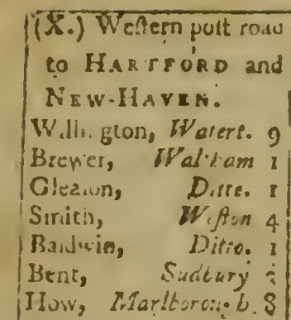Isaac Jones Of Weston - "He Was Deemed A Tory"
This year will be the 250th Anniversary of an incident in Boston that has become known as the "Boston Tea Party". There, on the night of December 16, 1773, a band of protestors boarded three ships carrying tea, unloaded and smashed the chests it was packed in, and threw 92,000 pounds of it into the harbor to protest the tax imposed to raise money for Britain and support the British East India Company. In response, the British government shut down the port of Boston and passed other measures that would lead to the outbreak of the Revolutionary War on April 19, 1775.
Three months later, on March 28, 1774, a lesser known incident referred to by some as the "Weston Tea Party" occurred at the inn of Isaac Jones in Weston, Massachusetts. Jones was considered a Tory by many of his neighbors, as he remained loyal to Britain. In addition, he allegedly had continued to sell tea despite the strong opposition to doing so across Massachusetts and being warned against doing so.The inn, built in 1768, still stands. Today it is a museum, the Golden Ball Tavern, open to the public for tours on the second Sunday of each month and for special events, and well worth a visit. I toured the building as it seemed likely that in November of 1777 Lieutenant-General John Burgoyne and the British and German troops of the Convention Army passed by on their way to Cambridge, and some (likely officers) may have stopped there to eat or to stay.
British Ensign Thomas Anburey's account of his travels suggests several did. In a letter from Cambridge he dated November 30, 1777, he wrote: "The last town we left, before our arrival in this place, was Westown [sic], where we found the most convenient inn of any on the road, it is equal to most in England, the rooms commodious, provisions good, and servants attentive...". [2]
Burgoyne may have stopped there as well. Brigadier-General William Whipple noted in his journey that after being delayed in Marlborough on the morning of November 5th, he caught up with Burgoyne and the others in Weston, where they ate dinner before continuing on to Watertown. [3]
It is possible of course that Anburey and Burgoyne stopped somewhere else. There were other inns in Weston, understandable given its location on the Post Road from Boston to Hartford. Samuel Stearns "The North American's Almanack" for 1776 lists two, Smith's and Baldwin's, but not Jones. One detail in Anburey's account though suggests that he stayed with Jones.According to the timeline on the Golden Ball Tavern's website, by 1777 Isaac Jones had "changed his loyalties - He now worked for the Revolutionary Army, hauling supplies to the French in New York." (though I'm not quite sure where or why the French would have been in New York in 1777). According to Anburey however, in addition to running a "most convenient inn ... above all, the landlord is a friend to our Government ... he was deemed by the Americans a rank Tory." [4] Visiting the Golden Ball Tavern and taking the tour, I learned that Paul Revere had stopped there in 1777 also, while escorting prisoners of war, and that he later labeled ("maligned") Jones and his family as Tories.
Perhaps Isaac Jones had not changed his political views. Perhaps, like many others who were caught up in the shifting tides of revolutionary America, he simply found a way to survive in the political climate of his time. Perhaps others suspected that as well, and that explains why Revere labeled the Jones family as Tories, and his competitors Smith and Baldwin were listed in Stearns 1776 almanac, but the "most convenient inn" of Isaac Jones was omitted.





Comments
Post a Comment